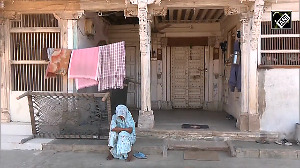General Musharraf was feted and engaged this past week by the Indian government, and many lined up to meet and greet the general in his new avatar of 'statesman.' After all, had he not left his military apparel behind and appeared in Saville Row suits? Indians fall for this kind of drama and play acting, and have been irredeemably hurt for their naiveté and their simpleton qualities of trusting without verifying, or trusting despite multiple bitter experiences of being led by the nose.
The invisible shadow over India, Pak
The latest round of deliberations in New Delhi is therefore, for many of us sceptical observers, déjà vu all over again.
In an interesting presentation in November 2004 in New Delhi, Major General (retired) Vinod Saighal had pointed out that Pakistan's mischief-making potential remains strong despite all of its internal problems. He argued that for more than 50 years India has been a sucker to Pakistan's manoeuvrings, and that India's policy has almost invariably been reactive, except in the case of the liberation of Bangladesh.
But it is time to move, and time to change, we have been told this time. We were told the same every time India initiated a dialogue with Pakistan. And every time India got burnt, with the worst experience being that of Kargil following Vajpayee's visit to Lahore in 1998.
The India-Pakistan relationship is a classic example of a 'co-dependency' relationship that every marriage counsellor is aware of and warns weak and gullible partners about. For those who have not heard of 'co-dependency relationships' it is a relationship where one spouse believes the promises that an abusive partner makes every time they break their promise. 'I am not going to hit you again, ever' the abusive husband tells his wife after beating her the twentieth time. And the wife thinks that this time he means it.
Indian leaders are like the abused wife: they continue to believe their violent neighbour/partner will change next time.
Are we too quick to praise Musharraf?
Why is Pakistan still a problem for India, despite George Bush and Condoleezza Rice's vote of confidence for Musharraf? For starters, remember that Pakistan has been in the forefront of efforts to undermine India's efforts at securing a permanent seat in the UN Security Council. It has brought and kept the Kashmir question alive in global forums. In concert with China, it has sought to limit India's access to Central Asia. It has bled India by instigating and sustaining cross border terrorism that has driven 300,000 Hindus from Kashmir, and killed and maimed thousands of Indian soldiers and paramilitary forces.
By forcing India to spend enormous resources to counter the threat of low intensity conflict it has generated in Kashmir, Pakistan has hobbled India and kept it from attaining self-confidence and prosperity. Not happy with its forays on the Western border, it has queered the pitch on the Indo-Nepal and Indo-Bangladesh borders.
In concert with its sympathisers in Bangladesh it has masterminded the exodus of Hindus from Bangladesh, and has enabled the illegal migration of suspect elements into India for carrying out anti-Indian activities at opportune moments.
On the cultural front it has, in concert with Saudi Arabia, contributed to the enormous proliferation of madrasas in India and other parts of the subcontinent, notably in Bangladesh and in the border regions of Nepal and the Northeast. It has also fuelled and sustained militant groups in the Northeast, while encouraging the creation of terrorist cells in the interior of India.
By circulating fake Indian currency in the country, especially 500 rupee notes, Pakistan has tried to undermine the Indian economy. It has encouraged and abetted the activities of Mumbai's underworld, which was not only behind the multiple bomb attacks in Mumbai in 1993 but as recently as in the dastardly bomb attacks in 2002.
The Mumbai underworld has infiltrated the Mumbai film industry which has enormous cultural and social implications, and we all know where Dawood Ibrahim has made his home -- in Karachi.
If these activities are not enough, Pakistan has encouraged the political-criminal nexus in Maharashtra and Gujarat, and tried to subvert Indian Muslims through well-orchestrated propaganda.
So, why do Indian leaders, even the 'Hindu nationalist' BJP leaders, succumb to the 'blow hot blow cold' strategy of Pakistan? From a pragmatic and realistic approach to human affairs that the rest of the world takes, Indians have, under the influence of influential leaders, been asked to take some sort of a moral high road: this has led to the kind of self-delusion a la the 'panchsheel' approach to dealing with crooked and cunning neighbours.
Major General Saighal also believes that India has been artificially weakened through wrong policies, wrong military priorities and an inability to grasp the essentials of the threat that it faces from Pakistan and the manner in which it should be handled.
For India to emerge as an important player on the global scene, it has to be able to tackle the radical Islamist threat from Pakistan, which has increasingly been extended to the eastern sector and even within India under the nose of India's intelligence agencies. Therefore, unless India has a viable capacity for breaking the impasse that has developed on the subject of cross border terrorism and cross border influx of illegal immigrants it would not be in a position to prevent the rise of Islamic fundamentalism as well as the Maoist-Naxalite threat on the subcontinent.
In any permanent de-escalation with Pakistan it will have to be ensured that cross border terrorism is ended not only into J&K, from other sectors as well -- in the northeast, including Bangladesh and Nepal. Otherwise, while Pakistan may reluctantly concede to ending cross border infiltration into Kashmir, it might redouble the effort in other sectors. Where is the public statement from New Delhi about such Pakistani promises? Where, for example, is the promise of a no first nuclear strike from Pakistan? These are fundamental issues and cannot be brushed under the diplomatic carpet in pursuit of an illusory "peace" with Pakistan.
Major General Saighal, in his book Dealing with Global Terrorism: The Way Forward argues that unless Pakistan delivers on its promise to stop supporting the unconventional war of jihadi terrorism India should not make nice with Pakistan. Peace, he argues, can only come after comprehensive dismantling of terrorist cells, and the military posturing by Islamabad. Unfortunately, from what we can glean from public statements after the New Delhi meet, India seems to have decided to continue the co-dependency relationship.
Ramesh N Rao, Ph D, is Professor of Communication, Truman State University, Kirksville, Missouri, USA.






 © 2025
© 2025